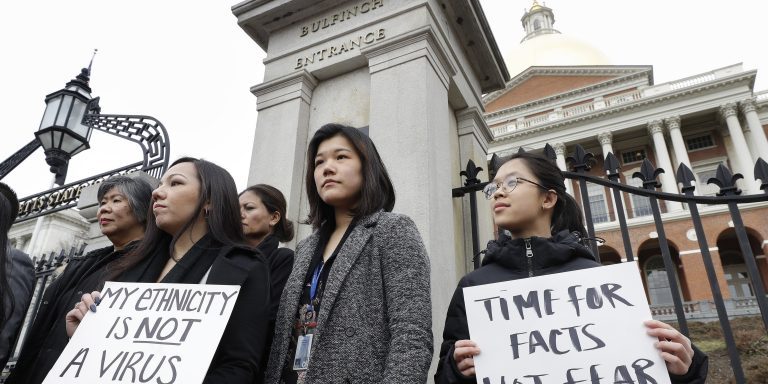INTELBRIEF
April 24, 2020
IntelBrief: COVID-19 and Its Impact on Racism and Hate Crimes

- In the United States there has been a rise in hate crimes against Asian-Americans fueled by racists casting blame for the pandemic.
- In India, the already-tense relations between the Hindu majority and Muslim minority are worsening over unfounded pandemic fears and conspiracies.
- Some reports suggest that Africans in China have been harassed, discriminated against, and even evicted from housing.
- Hateful rhetoric and scapegoating have remained ahead of the curve, and if nothing is done to address hateful actions and policies, the damage to already tenuous social fabrics will grow exponentially.
One of the most predictable, yet unfortunate, aspects of the ongoing COVID-19 pandemic is that individuals and groups worldwide, from the United States to India to China, have used the spread of the coronavirus to marginalize minorities and engage in racist-fueled hate crimes. In some cases, the perpetrators have been encouraged by opportunistic social and political leaders who, rather than work on tackling the challenge of the coronavirus, spend their time propagating in conspiracy theories and racist scapegoating. Practicing xenophobia furthers the goal of many populist and nationalist movements seeking to demonize ‘the other’ as the cause of societal ills. The spike in racist and anti-Semitic hate crimes does not simply parallel the rise of infection and death rates, but rather precedes and exceeds those rates. At the earliest opportunity, white supremacists, xenophobes, and hate-mongers have sought to fit the pandemic into their pre-existing, grievance-filled narratives.
The fear of the COVID-19 pandemic is a useful tool for those looking to divide their respective societies into ‘us versus them’ narratives. In the United States, there has been a steep rise in hate crimes against Asian-Americans. According to the Stop AAPI (Asian-American Pacific Islander) hate database, there were 1100 such incidents of coronavirus-related attacks in the last two weeks of March 2020 alone. These attacks ranged from verbal assaults and intimidation to physical attacks. U.S. President Donald Trump, and his accompanying echo chambers on social media, have labeled the virus as ‘the Chinese virus’ or the ‘Wuhan virus’ despite the warnings of many that doing so will stigmatize Asians of many backgrounds and further divide an already polarized society.
In India, the pandemic is being used by social, religious, and political leaders to exacerbate already strained relations between the majority Hindu population and the minority Muslim population. Many Muslim day laborers lost their jobs, and the situation has been made worse by officials from the ruling Hindu nationalist Bharatiya Janata Party (BJP). Hindu nationalist politicians have continued to push the conspiracy that the pandemic is being intentionally spread by Muslims in India and neighboring Pakistan as part of a holy war against Hinduism. The ugly rhetoric is resulting in real-world threats for India’s 200 million-member Muslim community, with social boycotts against Muslims and areas in Delhi where Muslims have been prevented from entering. Meanwhile in China, where the coronavirus originated, Africans are being discriminated against and barred from entering certain businesses and establishments. Some reports suggest that Africans in China have been harassed, discriminated against, and even evicted from housing.
The pandemic will worsen all pre-existing religious and ethnic prejudices and hatred unless leaders make a very public and sustained effort to counter the concept that the virus is the result of ‘The Other.’ Some political leaders have gone to great lengths to stress the importance of unity, especially during these times of isolation. Others, such as many social and political leaders in the United States, have fallen far short in this regard. The pandemic will exacerbate blame cast upon immigrants, foreigners, and those suffering through economic inequality and lack of access to resources. The mitigating efforts to slow the rate of infection (to ‘flatten the curve’) have led to tens of millions of people losing their jobs worldwide. Many Western democracies have worked to create effective social safety nets that during this time of unprecedented work closures can provide income and health care to its citizens. The United States is less prepared to deal with the economic fallout than many European countries and is already experiencing a level of unemployment unseen since the Great Depression of the 1930s. Nearly everything about the pandemic is a lagging indicator, with deaths today coming from infections weeks ago. If nothing is done to address the divisive language that drives the hateful actions and policies surrounding COVID-19, including the ongoing polarizing rhetoric and scapegoating, the damage to weakened social fabrics will continue to grow exponentially as the pandemic ravages societies.
.
For tailored research and analysis, please contact: info@thesoufancenter.org